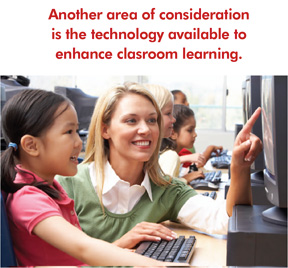Shaping your Child’s Future
How Learning in the Classroom Affects the Education Experience
by Dawn Sloan Downes

Moving to a new city under any conditions can be daunting. Moving to a new city with children makes it all the more challenging. Not only do you need to find an attractive, safe community that suits your lifestyle and affords you a convenient commute to your new job, you also have to focus on finding the best schools for your children.
As parents, you worry about every aspect of your children’s lives. Choosing the right school is critical to their future because no other experience outside of the home will shape them to the same degree. You know that not every teacher, school and curriculum will be a good fit for every child. Yet with close to 300 private schools and public school districts in the Atlanta area, how can parents identify the best learning environments for their children? What can they do to maximize their children’s learning opportunities?
Quite a lot, says Marcia Prewitt Spiller, head of school at The Children’s School, an Atlanta private school that celebrated its 40th anniversary last year.
“Parents should share their children’s interests
and learning styles with their teachers to get feedback on how a particular curriculum might accommodate the child’s needs. While most schools don’t have curricula based on individual
instruction, many design their curriculum
to meet a wide variety of learning styles,” says Spiller.
As to how to assess a particular teacher’s strengths and qualifications, Spiller advises parents
to “assume that individual teachers have the qualifications to meet the learning needs of the students they teach.”
For parents who want a more definitive answer regarding teacher qualifications, they should know that since 2006, public schools have been required under federal law to ensure that all teachers are “highly qualified,” meaning they have full certification or licensure by the state, a bachelor’s degree and demonstrated competence in both subject(s) taught and teaching skills.
Parents of public school students can request verification of teacher qualifications under law by writing a letter to their school’s administrator.
While the qualifications required to teach at private schools vary based on the school and its affiliations, most require their teachers to be state certified, hold a degree and exhibit a high level of teaching competence. Catholic schools require teachers and administrators to be certified by the National Association of Private Catholic and Independent Schools.
There is no single governing body that certifies
private school teachers or accredits independent
schools. While teacher certification requirements
vary according to accrediting body, most state and national private school accrediting
organizations require schools to validate teacher quality and provide opportunities for professional development.
 As in public schools, if parents of private school students have questions or concerns about teacher qualifications, they should talk to administrators about accreditation standards, professional development and teacher retention to get a sense of the school’s policies regarding teacher qualifications.
As in public schools, if parents of private school students have questions or concerns about teacher qualifications, they should talk to administrators about accreditation standards, professional development and teacher retention to get a sense of the school’s policies regarding teacher qualifications.
Dr. Janna Dresden, an early childhood education
specialist and director of the Office of School Engagement at the University of Georgia’s
College of Education, reminds parents that parents and teachers are partners, not adversaries.
“We’re all on the same side when it comes to educating children, and we all need to recognize that we [parents and teachers] are the ones closest to the children … it is imperative that we work together.”
Dresden points out that even an “expert” like herself can misjudge a teacher but offers her thoughts on what parents should consider when deciding if a particular teacher is a good fit. “Does the teacher encourage a sense of community, or does she foster competition? Does the teacher focus solely on test scores, or does he create opportunities for real learning? Do the kids in a particular class seem interested, engaged and happy to learn?”
Those standards apply to schools as well, says Dresden. She suggests looking for schools with a broader purpose than achieving high test scores, then exploring further to determine if their specific curriculum and teaching methodologies seem like a good fit for your child.
Another area of consideration is the technology
available to enhance classroom learning. From supplementary podcast lectures, laptops and smartboards, many Atlanta-area schools offer
cutting-edge technology.
Marist School, an independent Catholic school that has been operating in Atlanta for over 100 years, abandoned the 70 PCs in its eight science labs for 70 “thin client” workstations from Wyse. Thin clients display programs and applications that run on network servers rather than on the local computer, making them less expensive to maintain and operate—as well as more secure—than older technology. The school’s library also houses an additional 25 thin client workstations that allow students to log in from home and complete assignments remotely.
Meanwhile, Woodward Academy, one of the largest private schools in the United States, has been working with architecture firm Perkins+Will to create a wireless campus.
“The trend in both public and private schools,” says John Poelker, associate at Perkins+Will, “is to get away from the computer lab model where students leave their classroom to use a computer. Today, schools are embracing a more collaborative learning model that encourages a more fluid transition between technology and traditional learning…At Woodward, we’ve created ‘soft spaces’ like cyber cafés that allow students a casual area where they can sit and work together in a relaxed atmosphere.”
Poelker points to another example of innovative, technology-driven thinking in Atlanta-area schools: “Whitfield County’s Coahulla Creek High School was built with collaborative learning in mind and utilizes project-based labs modeled on the Apple Store’s Genius Bar® where you have roving experts. In this case the experts are teachers, and students work individually or in small groups at their own pace.”
Yet to some, the two most critical technologies a teacher has at his or her disposal are email and a class website.
“Many of the best teachers today are utilizing
these two basic technologies to communicate
with parents and share vital information like homework and class projects in an efficient manner,” says Dr. Lesley Coia, associate professor
of education at Agnes Scott College. “What should matter to parents is not smartboards, but how effectively teachers communicate with them and with their students.”
While there is no magic formula to help parents identify the perfect teacher or school, by taking the time to ask the right questions and communicate your concerns with teachers and administrators, you can help your children make the most of their learning opportunities in almost any environment.
Tips for Refining the Classroom Experience
What to do if you find that your child’s teacher isn’t the best fit:
 Begin the discussion with the classroom teacher. Share your concerns and work together to develop a plan to help your child succeed.
Begin the discussion with the classroom teacher. Share your concerns and work together to develop a plan to help your child succeed.- Communicate openly and frequently in a respectful manner.
- Offer your child’s teacher feedback on your child’s specific interests, strengths, weaknesses and any changes you’ve noticed.
- Remember that you and your child’s teacher are partners with a common goal. Work together toward your child’s success.
- If your child’s teacher is unresponsive or you do not begin to see change, schedule appointments with your school’s administration.







